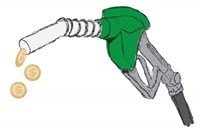
Subscribe & Follow
Advertise your job vacancies
Fuel price rise presents challenges in 2014
South African companies that import goods from other regions have come under increasing pressure over the last 10 years, as a result of continuous, steep increases in the petrol price.

Image: Free Digital Photos
Since January 2004, the price of fuel in South Africa has increased by a massive 252% for petrol and 276% for diesel. The US Energy Information Administration also recently forecast the Brent crude oil price to average USD107 per barrel during the fourth quarter of 2013 and USD102 per barrel in 2014.
Penny Henley, logistics manager of Blue Strata, the South African integrated end-to-end import and working capital specialist, said that while the EIA forecasts suggest that the average price of oil may decline marginally in 2014, this provides little relief for importers that are already under significant pressure.
"Importers are battling to offset the already steep rises in the fuel price. This, combined with other steep prices rises in electricity, forthcoming e-tolls and possibly higher wages, means many importers may seeks to mitigate the impact by finding cheaper alternatives elsewhere in the business," said Henley.
"While sourcing cheaper options may be advisable in some respects, caution should also be exercised. Choosing a transportation company purely on the basis of price could place the company at severe risk. Some companies have been known to undercut significantly on pricing in order to gain new business, with the result that the prices creep back up over time, or else they cut back on other areas such as maintenance, leaving the vehicles in a poor state and at risk of breaking down, creating delays or stock shortages."
Look for long-term relationships with transporters
She advised that companies should instead look for long-term relationships with their transporters to ensure that they can deliver on their promises. "One route that companies can take to minimise the impact is to ensure that transporters accurately adjust for any fuel surcharge, so that any increase is relevant to the corresponding rise in the fuel price."
"Most transporters have a base price with a fluctuating fuel surcharge on top of that, so Blue Strata monitors the costs charged by transporters and any fuel surcharges imposed by them to ensure that the rise is relevant," she said.
Henley explained: "If an importer doesn't understand how this fluctuating surcharge works and how it can be accounted for, then a transporter could potentially increase it by too high a margin. This isn't a core part of a business, so often importers don't monitor these conditions and aren't able to work out an accurate calculation on the surcharge."
Should the petrol price not stabilise in the longer term, she said that alternative methods of transport, such as rail, may start to prove a viable consideration for importers. "While there are a number of initiatives currently being rolled out to bolster South Africa's railway infrastructure, rail services are still not reliable enough to ensure delivery on a specified date.
"That said, the differentiator between road and rail is starting to narrow considerably, as the fuel price continues to escalate and it is becoming harder to justify the differential in price between the two. As a result, we may begin to see some businesses prepared to accept delays in turn for a cheaper delivery cost," added Henley.







